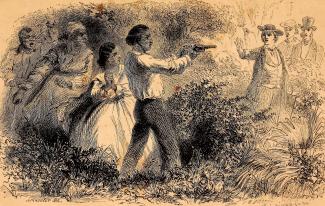
Education
Teaching enslaved people to read or write was illegal - slavers knew the power of education. But so did we! Many of our ancestors risked death to educate themselves and others.
Work Sabotage
Enslaved workers would slow down their work production, fake illness, purposely break machinery, and steal products from the slaver - all of which would mess with what the master cared about most - his money!
Running Away
Some enslaved people ran away temporarily, to visit a friend, spouse, or child at another plantation. Others ran away permanently, to form a “maroon” colony or to a free state or country.
Preserving Culture and Community
One of the worst aspects of slavery was dehumanization. Keeping culture and community alive was a major way to resist this - our ancestors were still human, and would never give that up! Dance and music were ways they could communicate across language barriers AND secretly make fun of slavers!
Violent Uprising
There were hundreds of violent uprisings of enslaved people throughout the history of slavery. From the Stono Rebellion to the German Coast Uprising, enslaved Africans fought back, with blood, against all odds!